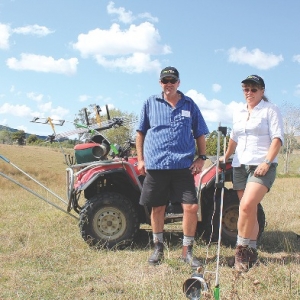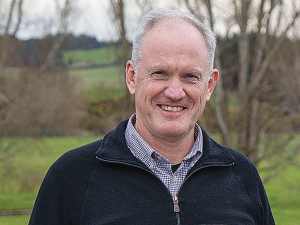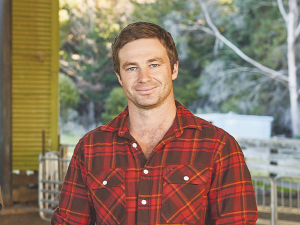Drystock subdivision involves dividing a section of the property into smaller blocks and running smaller groups of stock on them which are shifted every one to two days.
Studies show even 10ha of subdivided land will generate $40,000 a year in profits from pastures due to higher stocking rates and better control over stock rotation.
However, there hasn’t been a big movement toward drystock intensification and McCloy blames initial capital livestock costs and the time needed to shift stock daily onto new pastures. McCloy believes a Kiwitech fencing system can markedly reduce stock handling times.
He runs 1000 bulls on 300ha and says he has all the stock work done in three hours. “The system has been set up to work as efficiently as it can with the least amount of input or infrastructure.”
The simplicity of the system attracted and enabled him to keep at it, he says. “The creator of Kiwitech, Harry Weir, has developed hardware that is robust and durable and has been proven to withstand the test of time. If a system takes a long time to manage during winter then a farmer is most likely to throw it away.”
McCloy has used Kiwitech gear on his property since 1999 and has sold it since late 2012. His wife Chrissy suggested it after he had been talking about it at local field days. “I was going to all the field days and raving about this gear to the point where my wife Chrissy told me to see if Kiwitech would take me on as a rep, as I was already promoting their products”.
He is still attending field days and was asked at a recent lower Northland Beef and Lamb field day focusing on subdivision to do a costing to subdivide 10ha.
McCloy worked on the basis of two 5ha paddocks with a pumped water supply. This was divided into 16 cells with three single-wire fiberglass rod fences and two 2-wire fiberglass rod fences. Water was provided in eight micro-troughs.
The fencing for the set-up cost $2037, the water an extra $1,294, bringing the total cost to $3,331 including GST before stock are put in.
McCloy says setting up fence lines requires only driving in paint-coated fiberglass rods along fence lines, before attaching a plastic insulator and then running out steel wires. Wires are tensioned with a spring, which provides the fence with the ability to flex without breaking or stretching. High stress points are reinforced with arrow posts, which strengthen the fence.
When farmers need to shift stock from one cell to another they just need to pin down the fence, then get stock to walk over it.
Getting to stock on a quad is even easier thanks to a specially-designed fender that allows the bikes to just drive over fences without stopping. “I drive over about 50 fences a day and don’t even think about it.”
Gear breakages are unusual. “You will periodically get an animal that gets spooked and goes through a fence, but it bounces back after them. So when you move the animals you don’t have the added job of repairing a fence they have destroyed. The fiberglass rods are coated with a thick UV-resistant paint coating, I have standards I bought when I started using the system 13 years ago that I can comfortably grab today and not have to worry about fiberglass splinters.”
www.kiwitech.co.nz

















